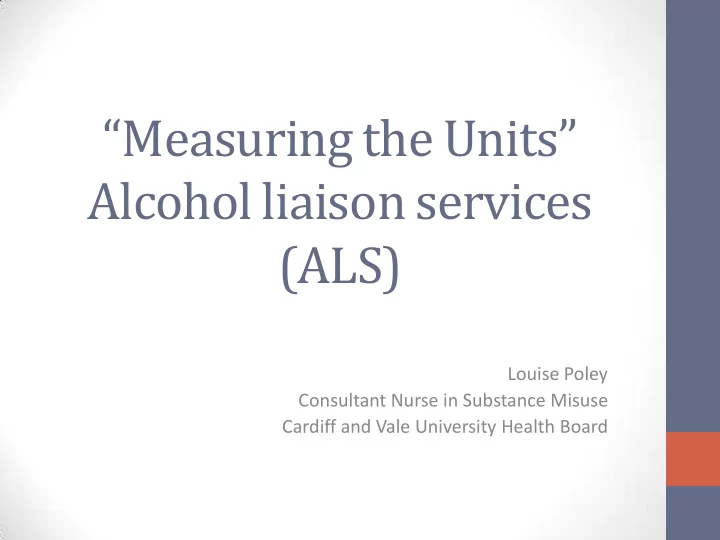

“Measuring the Units” Alcohol liaison services (ALS) Louise Poley Consultant Nurse in Substance Misuse Cardiff and Vale University Health Board
The report highlights A younger than average cohort A lack of specialist interest and input The opportunities to make a difference that were missed- both to individuals and health service costs Engagement with ALS can improve patient outcomes yet only 3% of hospitals reported having a comprehensive service
The Aims of an ALS To improve the patient experience and outcomes Reduce the length of stay in hospital when appropriate - early identification and prompt intervention Reduce readmission rates by utilising a stepped care approach - Brief interventions for hazardous drinking and engagement with specialist services for dependent drinking Co-ordinate care and treatment during admission
The Aims of an ALS A multi-disciplinary approach to engaging patients with appropriate community services and support networks To change negative perceptions, improve cultures and raise the profile of the management of alcohol To develop effective protocols and pathways of care that support sound and ethical clinical practice
The Roles of an ALS Prevention Clinical management Engagement with treatment Training and education Development of clinical guidelines, care pathways and hospital strategies
Prevention - Screening Routine, early identification of hazardous, harmful and dependent drinking - excessive drinking not always evident Comprehensive history taking for heavy/dependent drinking Opportunistic health promotion intervention in itself May be predictive of severity of withdrawals and inform clinical management Fast Alcohol Screening Test/AUDIT
Prevention - ABIs Widespread delivery of alcohol brief interventions Personalised feedback, health advice, harm reduction techniques, written information Teachable moment - Right place, right time Cost effective Can be conducted by almost anyone in most settings Perceived Barriers Lack of knowledge, skills, time Competing priorities Cynicism regarding effectiveness
Clinical management Responsive and comprehensive assessment including co- morbidities - mental health problems/poly-drug use Management of alcohol withdrawals Implementation of CIWA-Ar Prevention and management of complications including Wernicke’s and Delirium Tremens Focus on repeat attendees – increased bed days may prevent future bed days/admissions Onward referral and engagement with appropriate treatment
Engagement Assessment of need and complexities Motivational work Liaison, onward referral to appropriate community services Addiction Units GPs Housing organisations Counselling Services Mental health services Relapse Prevention Programmes LA for Assessment for Rehabilitation
Training and Education Widespread comprehensive training programmes for nursing and rotational doctors Screening and brief interventions Comprehensive history taking and assessment Clinical management of alcohol withdrawals Prevention and management of associated complexities Availability of and appropriate referral to community resources E-learning packages University modules for under/post graduates
Clinical Guidelines Comprehensive hospital alcohol strategy that includes Routine screening and Brief interventions Clinical guidelines and pathways Management of alcohol withdrawals and complications Referral criteria Discharge planning
Cardiff Experience One liaison nurse for:- 2 teaching hospitals 11 miles apart total of 1,500 beds dealing with both drug and alcohol related admissions 9-5 weekdays Poor staffing levels – challenging to release staff for training Amongst the busiest EU in the UK, high levels alcohol consumption in South Wales Community waiting lists
However…. FAST screening implemented in Unscheduled Care and short stay medical wards Brief Intervention training programme on-going and evidence of use CIWA-Ar implemented with training 650 + patients assessed, treated, referred on annually Wide network of multi-disciplinary professional support
However…. Clinical guidelines implemented for Pharmacotherapy of detoxification Administration of parenteral thiamine Management of illicit opiate users WKS care pathway implemented (Homeless-EU) Increase in appropriate community referrals Audit on-going
Recommend
More recommend